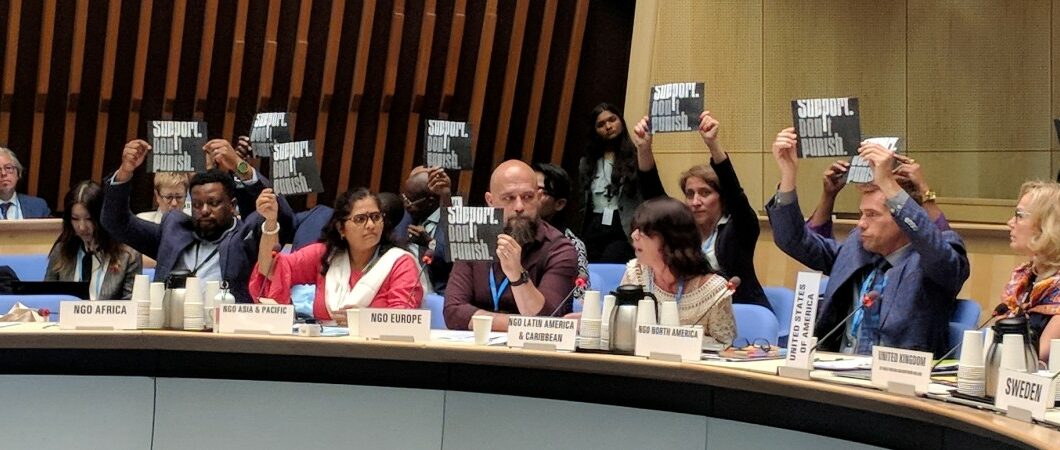After feedback received from representatives of civil society organizations following our initial statement, during late March and early April 2018, the NGO Delegation undertook and completed several key consultations, which included meetings with the UNAIDS Secretariat Staff Association (USSA), the United Kingdom in their capacity as current PCB Chair, and two civil society telephone consultation sessions with our CSO advisory group.
The purpose of the consultations was to gather feedback, elicit reactions and constructive recommendations on the Five Point Plan to prevent and address all forms of harassment and abuse of authority for greater accountability and transparency within UNAIDS, and on the independent expert panel proposed by UNAIDS charged with a top to bottom review of the processes to address workplace harassment, violence, bullying and other forms of unethical behavior.
From the consultations, the NGO Delegation was informed of current workplace institutional/organizational procedures and practices by the USSA, provided an overview of the task and sensibilities of establishing the independent expert panel by the PCB chair, and invited to create and maintain an open and ongoing process for input and constructive feedback by the participants on the civil society calls. The NGO Delegation is appreciative of the sharing of information and constructive recommendations and feedback that was subsequently reported during follow-up meetings with the UNAIDS Secretariat, and Bureau.
- The Delegation welcomes the creation of the Independent Expert Panel consisting of external individuals to review current and past practices and to enhance the Five-Point Plan further. This panel will be convened by and report to the PCB, the NGO Delegation as members of the PCB, and also through the PCB Bureau. Independent experts from civil society organizations will be invited to become a part of the panel, and the NGO Delegation will work to support the needs of the panel and dedicate time and efforts to ensure a fully functional mechanism.
- The work of the Independent Expert Panel will be primarily forward-looking. However, it will also review the current processes and procedures within the UNAIDS Secretariat and will include looking back over the last seven years in an effort to assess the organizational culture of the UNAIDS Secretariat with particular reference to how harassment concerns and issues are brought forward and addressed, including sexual harassment, sexual exploitation and abuse, bullying and abuse of power. The Panel will seek to understand why there are reports of high levels of harassment when staff are surveyed about the issue 1 on the one hand, but very few formal complaints have been brought forward. The Panel will evaluate the effectiveness of existing policies and procedures at the UNAIDS Secretariat; and finally, the panel will recommend a comprehensive set of prioritized measures relating to organizational culture, policies, and procedures which will enable the UNAIDS Secretariat to effectively prevent and address harassment, including sexual harassment; sexual exploitation and abuse; bullying and abuse of power in the workplace.
- Regarding the timeline, the PCB Bureau agreed to ensure engagement with member states and other stakeholders and committed to holding a series of consultations on the Terms of Reference with the three constituencies of the UNAIDS PCB (Member States, PCB NGOs, and Cosponsors). On 30th April, the PCB Bureau met to agree on amendments proposed during the consultations. It is expected that the final ToR will be shared in the first week of May.
- The Panel will aim to present a finalized report to the 43rd PCB in December 2018, at which point a management response to the report will be expected. We have been informed about the possibility of a preliminary report to be provided to the 42nd PCB in June 2018. This will depend on the progress in forming the panel.
- The NGO Delegation will continue to work closely with the PCB Chair, PCB Bureau, USSA, and civil society organizations to ensure UNAIDS follows an accountability process.
- The NGO Delegation will continue to work with members of civil society to conduct regular consultations, particularly regarding progress made by the independent panel, including generating feedback to ensure a robust interim report and final recommendations for approval.
The NGO Delegation is a representative of civil society voice, and therefore, we acknowledge and thank you for your input and feedback to continue to help us to better represent your voice at the UNAIDS PCB.
